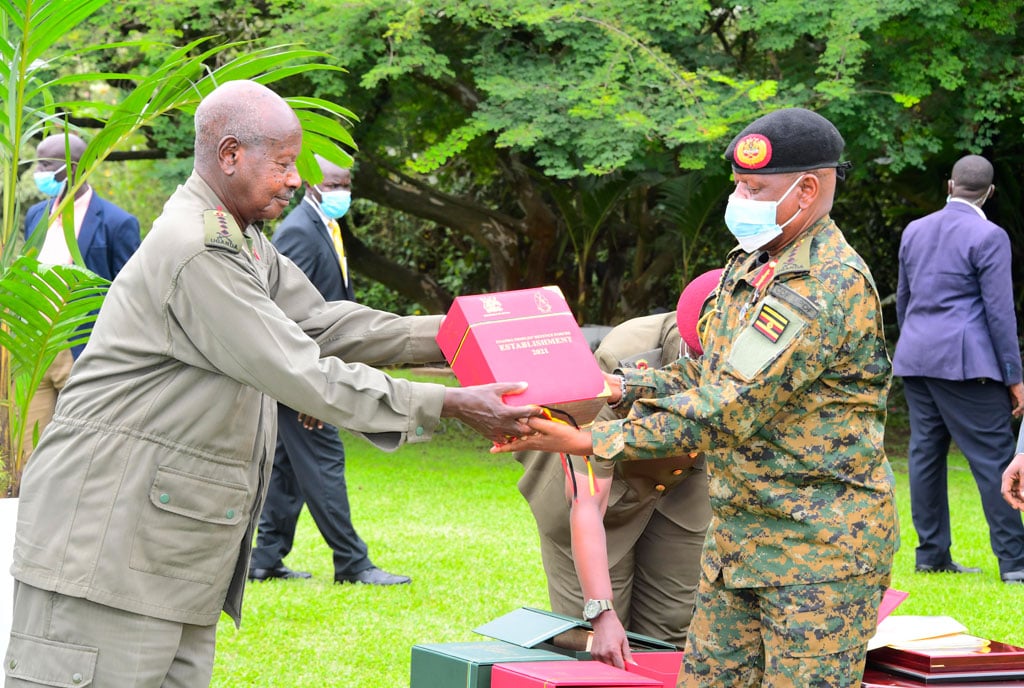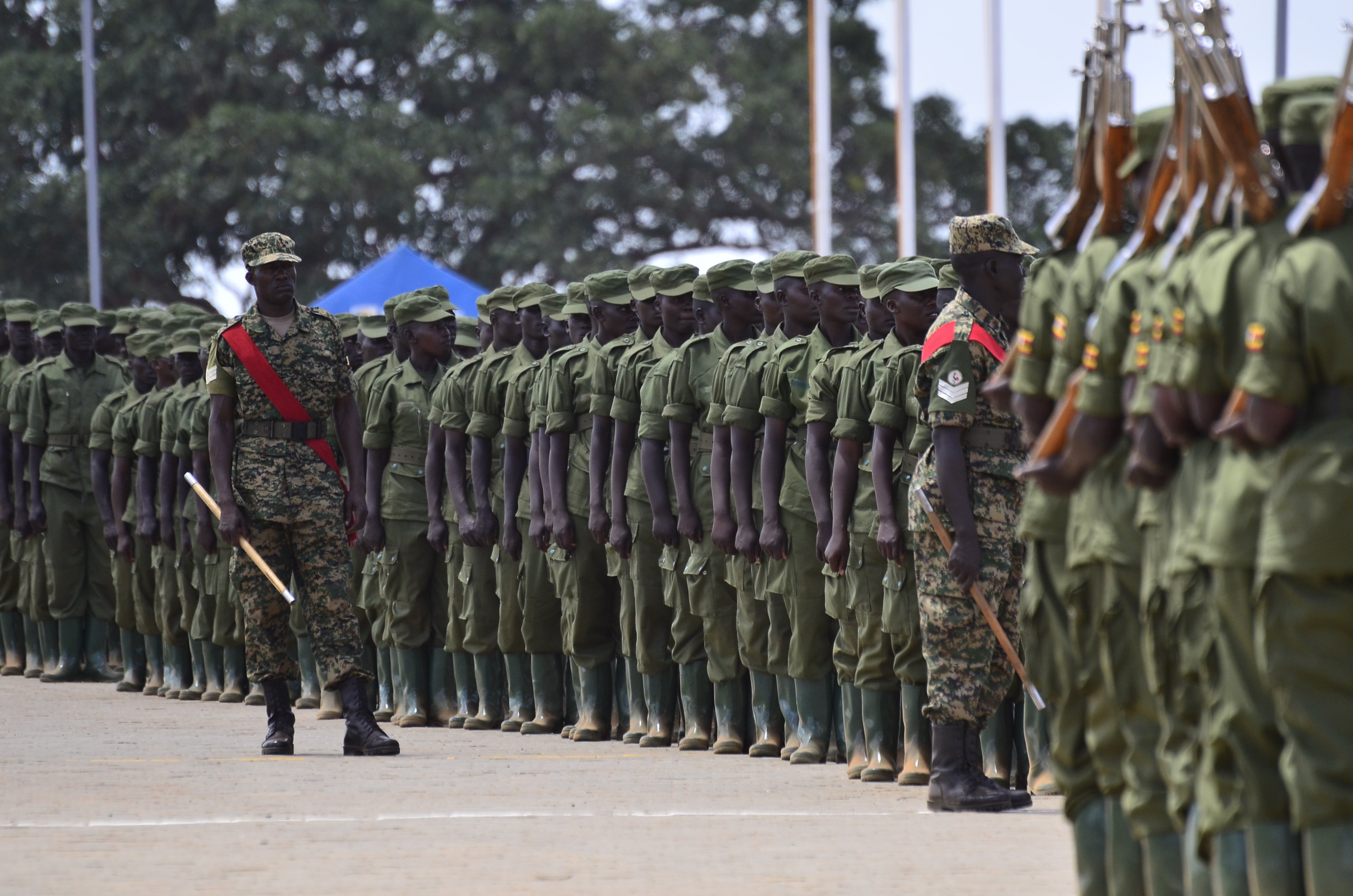Prime
How officers have trod thin line between army and politics

Gen Muhoozi Kainerugaba (L) exchanges a document with his father, President Museveni on May 3, 2023. PHOTO/PPU
What you need to know:
- The courts of law have made it abundantly clear that serving army officers cannot appear on the ballot paper.
- But as Derrick Kiyonga writes, some have been campaigning and making political statements in favour of the ruling party without punishment.
As supporters of President Museveni’s son, Gen Muhoozi Kainerugaba, keep on pinning his banners, ostensibly asking this active army officer to stand in the 2026 presidential election, the Court of Appeal opened a Pandora’s Box, saying serving military officers can’t participate in politics.
Justices Frederick Egonda-Ntende, Catherine Bamugemereire, and Eva Luwaga weighed in on the debate by throwing out Abim District chairperson, Yuventine Omara, from his position on grounds that he won the election while still serving in the national army, the Uganda People’s Defence Forces (UPDF).
During the 2021 elections, Omara, who belongs to the ruling National Resistance Movement (NRM), emerged victor after garnering 14,417 votes, beating John De West Ariko, who had stood as an Independent.

Ariko’s first attempt to have Omara’s victory nullified was not successful. Justice Jane Kajuga dismissed the case on a technicality that it had been filed under the wrong law.
Not contented with the decision, Ariko ran to the Court of Appeal, saying Justice Kajuga erred in law when she struck out the petition on grounds that the judge failed to determine the issue of whether the requirement for public officers to resign under the Local Government’s Act applies to active army officers.
Instead of determining the case, Justices led by Richard Buteera ordered that the election petition be re-heard, albeit under a different judge.
Early last year, High Court judge Issa Serunkuma nullified the election of Omara and ordered a fresh election. Dissatisfied with this decision, both Omara and Ariko went back to the Court of Appeal for a second round of litigation.
On one hand, Omara appealed against the nullification while Ariko put in a cross-appeal arguing that there was no need for a fresh election since his colleague had been illegally nominated in a race of two contestants.
Ariko told the Court of Appeal that Justice Serunkuma erred when he failed to declare him as the validly elected district chairperson when he did not find him unopposed at the close of the nomination exercise.
In considering Ariko’s cross-appeal, the justices cited the previous decisions in the Wakayima Musoke vs Robert Ssebunya 2016 case of Nansana Municipality, where the victory of Wakayima was nullified on grounds that he lacked the requisite education qualifications.
Ssebunya, who had emerged second, was declared the winner, and the Court of Appeal now said there are similarities with the Abim case.
“The only difference is that Mr Omara won the polls with a very wide margin. We accept the submission that the poll results decided in Mr Omara’s favour cannot sanitise his illegal participation in the primary elections of his party, his nomination, and his election. We also consider the fact that the elections were held and completed way back in 2021. Mr Omara technically lost his seat on 9/3/2023, the date of the judgement. If at all he has since acted as the LC5 chairperson, his tenure must be halted,” said the justices.
The Court of Appeal said from the evidence on the court record, that Omara remained in UPDF service at least until October 6, 2020, and continued getting salary from the Force.
“That said, the fact of receiving salary by itself would not result in annulling the election. What we consider more significant is that the appellant/Omara omitted to follow the correct procedure to secure his discharge from the army as such was wrongly nominated,” said the justices.
This was another episode of the question of military involvement in politics and public service.
The first under the NRM regime was when the Constitutional Court ruled in 1996 that Gen David Sejusa, then known as Tinyefuza, had ceased being an army officer the moment he was appointed a presidential advisor.
“Similarly, under the Public Service Standing Orders, a public servant is engaged on a full-time basis. It follows that an army officer cannot be a public servant at the same time. And so, when, in 1993, the President appointed the petitioner to a public service job as presidential advisor on contract terms, he thereby took him out of the army. There is no doubt that the President’s power to appoint army officers includes the power to remove them from the army,” the five justices said, but the ruling was later set aside by the Supreme Court that insisted that Gen Sejusa hadn’t retired from the army.
Section 16 of the Political Parties and Organisation Act stipulates that: “A member of the Uganda People’s Defence Forces, Uganda Police Force, the Uganda Prisons Service or a public officer or a traditional or cultural leader or a person employed in a company wholly owned by the government shall not- (a) be a founder, promoter or other member of a political party or organisation, (b) hold office in a political party organisation (c) speak in public or publish anything involving matters of political or organisation controversy; or (d) engage in canvassing in support of a political party or organisation or of a candidate standing for public election sponsored by a political party or organisation.”
If the above section is desecrated, Section 16 (20) says: “Anyone who contravenes subsection (I) commits an offence and is liable on conviction to a fee not exceeding 24 currency points or imprisonment not exceeding one year, or both.”

Gen David Sejusa (left) meets commander-in-chief Yoweri Museveni upon his return from exile in 2014. PHOTOS/ FILE
Though the laws are clear, army officers have made political statements indicating their support for the NRM.
For instance, in early 2013, Gen Aronda Nyakairima, then Chief of Defence Forces who has since passed on, threatened that the UPDF could carry out a coup d’état if politicians do not reform.
Aronda was reacting to the way some MPs had responded to the mysterious death of then Butaleja Woman MP Cerinah Nebanda in late 2012.
His comments not only astounded the political establishment in Kampala, with many politicians from either the NRM or Opposition not so sure what was next, but it also attracted a criminal suit from Brenda Nabukenya, then Luweero District Woman MP.
On January 23, 2013, Nabukenya filed the case at Nakawa Chief Magistrate’s Court claiming that Aronda, who was at the time a representative of the armed forces in Parliament, made statements that Parliament is not serious and that if it does not change course, “the military is going to take charge of the affairs of government”.

L-R. Female lawmakers Teddy Nambooze (Mpigi), Brenda Nabukenya (Luwero), Joyce bagala (Mityana), Kaaya Christine Nakimwero (Kiboga) and Anna Adeke Ebaju (Soroti ) address journalists at parliament on May 10, 2023. PHOTO | DAVID LUBOWA
Ms Nabukenya, now of the National Unity Party (NUP) but then belonged to the Democratic Party (DP), noted that Aronda’s statements inflamed the army to commit a crime, explicitly treason, against the State.
She said Aronda’s remarks amounted to the criminal offense of concealment of treason, terrorism, and aiding or inducing soldiers into acts of mutiny.
Aronda’s blushes were saved when Ms Joyce Kabaje, then Nakawa Chief Magistrate, rejected Nabukenya’s application in which she wanted criminal summons to be issued to Aronda over the comments he made.
Kabaje refused to sanction the charges because the application was incompetent. After all, private criminal proceedings must be accompanied by a letter from the local authorities.
Kabaje, much to Nabukenya’s annoyance, ruled that her court had no jurisdiction to entertain the case because Gen Aronda was a resident of Buziga, which is in the jurisdiction of Makindye Magistrate’s Court.
The magistrate ended her ruling by advising Nabukenya to channel her complaint through the Director of Public Prosecutions (DPP) for better management.
Aronda yet again found himself entangled in the unending debate of the military’s involvement in politics when he was appointed Internal Affairs minister in May 2013, yet he never retired from the army as the practice was previously.
In December 2006, Museveni’s brother, Gen Salim Saleh, retired from the army, and months later was appointed minister of Microfinance.
In May 2010, Gen Jeje Odongo had to retire from the army before he could take his oath as minister of State for Defence.

L-R: Gulu Archdiocese Vicar General, Msgr Mathew Odong, Justice Minister Norbert Mao and president Museveni's younger brother, Salim Saleh during Mao's homecoming celebrations in Gulu City on July 22, 2023. PHOTO/JESUS OKELLO OJARA
This practice seemed to have appeased activists and the Opposition who could not bear to see the military in civil office, but they were back to square one once Aronda was appointed.
Not that this particular appointment went unchallenged. Lawyer Eron Kiiza and MPs Joseph Ssewungu (Kalungu West) and Suzan Namaganda (Bukomansimbi Woman), who died in 2015, filed separate petitions challenging Aronda’s appointment.
According to the court documents, the petitioners wanted the court to throw Aronda out of his office because the Cabinet Aronda joined as a minister is a partisan institution since Uganda is under a multiparty system.
“Uganda is currently ruled by the NRM government and all members of the Cabinet are partisan owing to Article 117 and the common law doctrine of collective responsibility. It is not constitutionally or practically possible for a person who is part of the Cabinet to be non-partisan,” Kiiza’s petition, which was never heard, read.
In the run-up to the 2021 General Election, Brig Deus Sande, then commander of the Mechanised Brigade in Masaka, said the army would not hand over power to people that are “ideologically bankrupt”.

Brig Deus Sande sensitising residents of Setaala village after three people were gruesomely murdered on August 24. PHOTO/GERTRUDE MUTYABA
Sande, who was speaking to a group of NRM cadres in the central district of Masaka, said he had no shame in telling Ugandans “they are not ready to handover”.
“As long as we are still existing we are not here to give out [power],” Sande, who was dressed in military fatigue said, triggering laughter and applause from the NRM supporters.
“I have heard the other one telling you that don’t say this, but even if you say this: We are not ready to give out to ideologically bankrupt people.”
“That we are planning handover for you. Do you think we are planning a handover?” Sande asked as his audience continued to laugh.
“We are not planning a handover. We are consolidating,” he added. “Where Uganda is today is not where it was years back. It’s up to you to decide if Uganda is to become Somalia which is in anarchy or not.”
However, deputy UPDF spokesperson, Lt Col Deo Akiiki, said comments made by Sande did not represent the army position.
“Quote Sande as Sande. Army positions are communicated by the army spokesperson, it’s that simple,” Lt Col Akiiki told The Independent.

Lt Col Deo Akiiki, the deputy Uganda People’s Defence Forces spokesperson
Views
Mr Mwambutsya Ndebesa, a senior lecturer at Makerere University’s College of Humanities and Social Sciences, says we are not about to see a change in the status quo.
“The [NRM] regime came through the power of the gun. And it has been able to maintain power through the gun. That’s why you will always see the military in our politics one way or the other,” he says.
But Mr Isaac Kimaze Ssemakadde, the chief executive officer of Legal Brains Trust (LBT), says the Judiciary should kicked the military from our politics.
“You wouldn’t expect much from a Judiciary which is secretly entertaining advice from the Attorney General,” he says.





